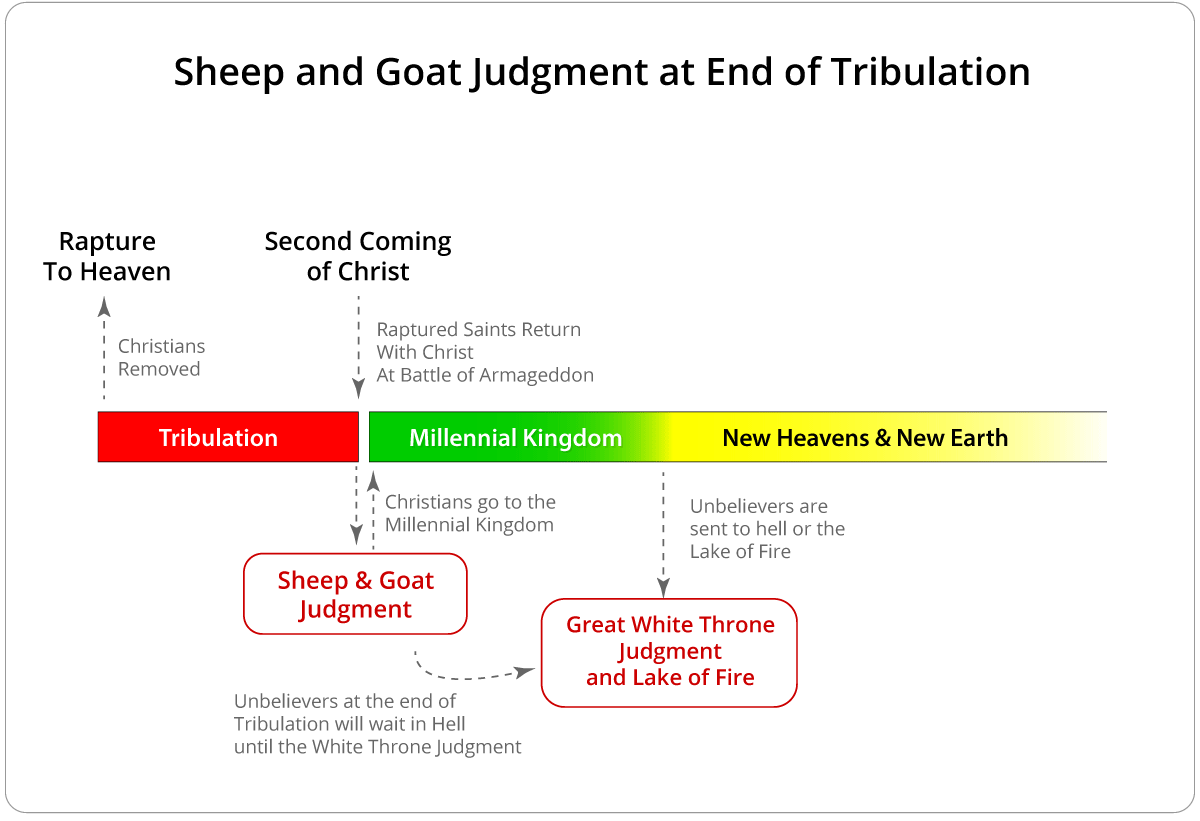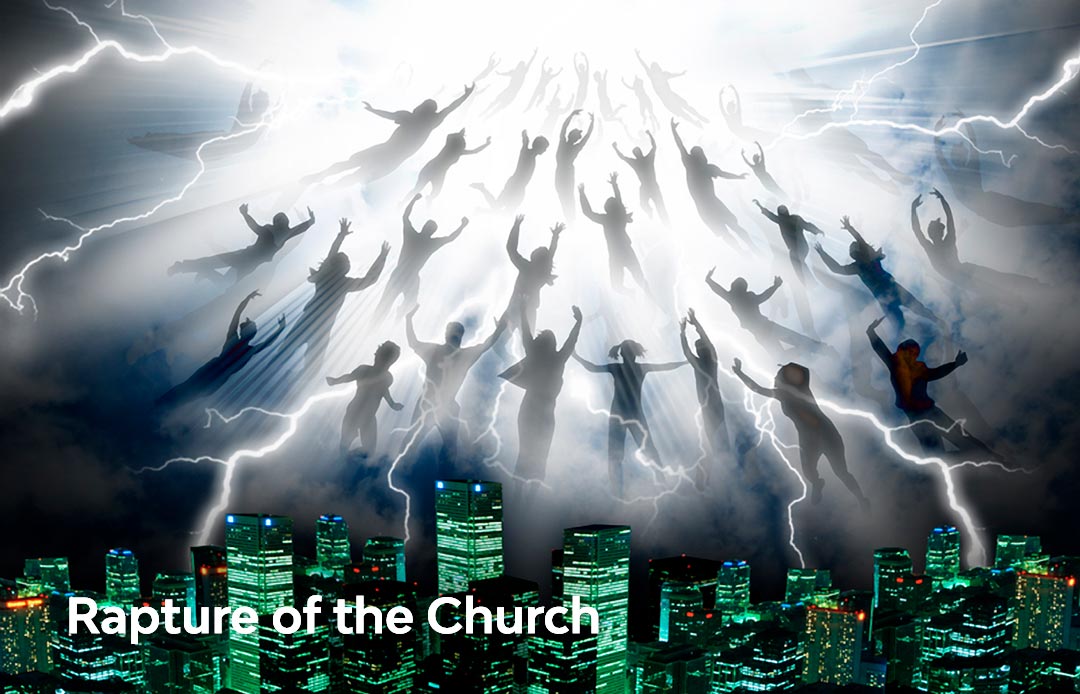
Our study today is about the rapture. Before we begin, I want to review four principles of Bible study that are extremely necessary for accurately understanding prophecy.
Confess Our Sins
The first and most important principle is found in Ephesians 4:30-32. In that passage, believers are warned not to grieve the Holy Spirit. How do we grieve the Holy Spirit? The passage reveals that we grieve the Holy Spirit when we sin. Consequently, His ministry in our lives is hindered. That means it is more difficult for the Holy Spirit to work in our lives. So when I study the Bible, I try to remember to pray and confess any sin to God before I open my Bible. Then I trust God to forgive my sins because in 1 John 1:9 He promised that
. . . If we confess our sins, He is faithful and righteous to forgive us our sins and to cleanse us from all unrighteousness. 1 John 1:9 (NASB)
The Holy Spirit Teaches Us
The first principle is to confess our sins. The second important principle in Bible study is given to us in 1 Corinthians 2:12-13. The passage says,
Now we have received, not the spirit of the world, but the Spirit who is from God, so that we may know the things freely given to us by God, which things we also speak, not in words taught by human wisdom, but in those taught by the Spirit, combining spiritual thoughts with spiritual words. 1 Corinthians 2:12-13 (NASB)
Here we are told that it is the Holy Spirit who teaches believers spiritual truth. If we combine the first principle with this principle, we learn that when we have sinned it is more difficult for the Holy Spirit to help us understand and enjoy the Bible. Have you ever opened the Bible and started reading only to have difficulty understanding what you read? If so, you may need to confess some sin(s) that you have committed before you continue. I have found that is usually my problem. Then after I confess my sin, I can understand what I am reading.
We Must Labor to Understand Scripture
The third important principle is given in 2 Timothy 2:14-15. The verse says,
Remind them of these things, and solemnly charge them in the presence of God not to wrangle about words, which is useless and leads to the ruin of the hearers. Be diligent to present yourself approved to God as a workman who does not need to be ashamed, accurately handling the word of truth. 2 Timothy 2:15 (NASB)
Verse 14 tells us to not be preoccupied with the trivial things in Scripture. We see this in our ministry at NeverThirsty. Some people are very interested in trivial questions. Paul’s point is that we need to seek to understand the message of a verse or passage. Verse 15 tells us how to understand the more important message. Believers are to diligently study as workmen. The word “diligent” has the idea of doing something with intense effort. That is, we must give great effort to study the Bible. It is not just a ten minute effort. Bible reading should not be like watching a movie, where we are a spectator passively watching. Frankly, I dislike the little devotional books. Often, they are just superficial teaching and may be incorrect. Too many believe that if they read a page in their daily devotional book, that is all they need for spiritual food.
Next, believers are encouraged to be workmen. That also helps us understand the word “diligent.” They go together. Excellent Bible study is serious work. What is the result? The result is that we discover the truth—“accurately handling the word of truth.” So our third principle in Bible study is to give great effort in order to discover and confirm the truth. We need to work at it. Opening the Bible to some random book, some random chapter and reading some random verses and then closing the Bible after finding something encouraging is not Bible study. That is like the man who opened the Bible and read that Judas hung himself. Then he turned to another passage that said, “Go and do likewise.” The reader easily ends up with error.
Let me encourage you to take a different approach to Bible study. Select a book of the Bible and read through it once a day. If the book is too large, divide it up into sections and read the first section every day for thirty days, before you go to the next section. Keep reading each section until you know what is coming next. As you read, start thinking of questions about what you are reading. Then start looking for the answers. Buy some books to help you learn. Build a library. Buy three good commentaries by known Bible scholars that can be trusted. Ask for help in selecting good books. Do not buy just any commentary at the local Christian bookstore. They often sell a wide range of good to bad commentaries, sometimes including books written by false teachers and poor scholars.
Now, there are other principles that should be included, such as understanding the culture of the time, archaeology, and the original languages of Hebrew and Greek. But I do not have time to cover these topics in this study. Let me raise a fourth principle.
Understand The Bible Literally
The fourth principle of Bible study is that we must understand the words of the Bible literally, unless it is obvious that we need to understand what we are reading symbolically or allegorically. An example is the parables of Jesus. They are symbolic. There are other examples that we will mention in this study. In order to understand the Bible accurately, we must ask what do the words in the Bible say? Many years ago, I was amazed when I attended a group Bible study. People were asked to read a passage of Scripture and then explain the meaning. Almost always someone did not understand the meaning. They often looked for some “deeper meaning” that could not even be found in the passage. What was even worse was when a Bible study leader did not explain the text, but thought everyone just had wonderful insights. It was not wonderful; it was often error!
This same problem can occur when believers study prophecy. The problem is worse when they understand biblical prophecy allegorically or symbolically and not literally. An example is found in Revelation 20:1-3 where we read,
Then I saw an angel coming down from heaven, holding the key of the abyss and a great chain in his hand. And he laid hold of the dragon, the serpent of old, who is the devil and Satan, and bound him for a thousand years; and he threw him into the abyss, and shut it and sealed it over him, so that he would not deceive the nations any longer, until the thousand years were completed; after these things he must be released for a short time. Revelation 20:1-3 (NASB)
Some claim these verses teach that Satan was bound and is still bound two thousand years later. They say that is why people are able to believe in Jesus today. But what about those who believed before the cross? This interpretation fails to account for people who believed in God before the cross. Enoch believed in God. Noah, Abraham, Sarah, and the other patriarchs believed. The entire city of Nineveh repented at the preaching of Jonah. The point is that Satan was not bound at the cross. That is an example of the use of inaccurate symbolism to interpret when it is not appropriate. When we do not read the Bible literally, then the meaning is left up to one’s creativity. Then anything is possible. Revelation 20:1-3 is a prophecy that says after the battle of Armageddon, Satan will not be free to roam the earth seeking someone to devour (1 Peter 5:8). The principle of literal interpretation of Scripture is essential to an accurate understanding of prophecy, or the believer will not learn truth. They will cling to error and teach error.
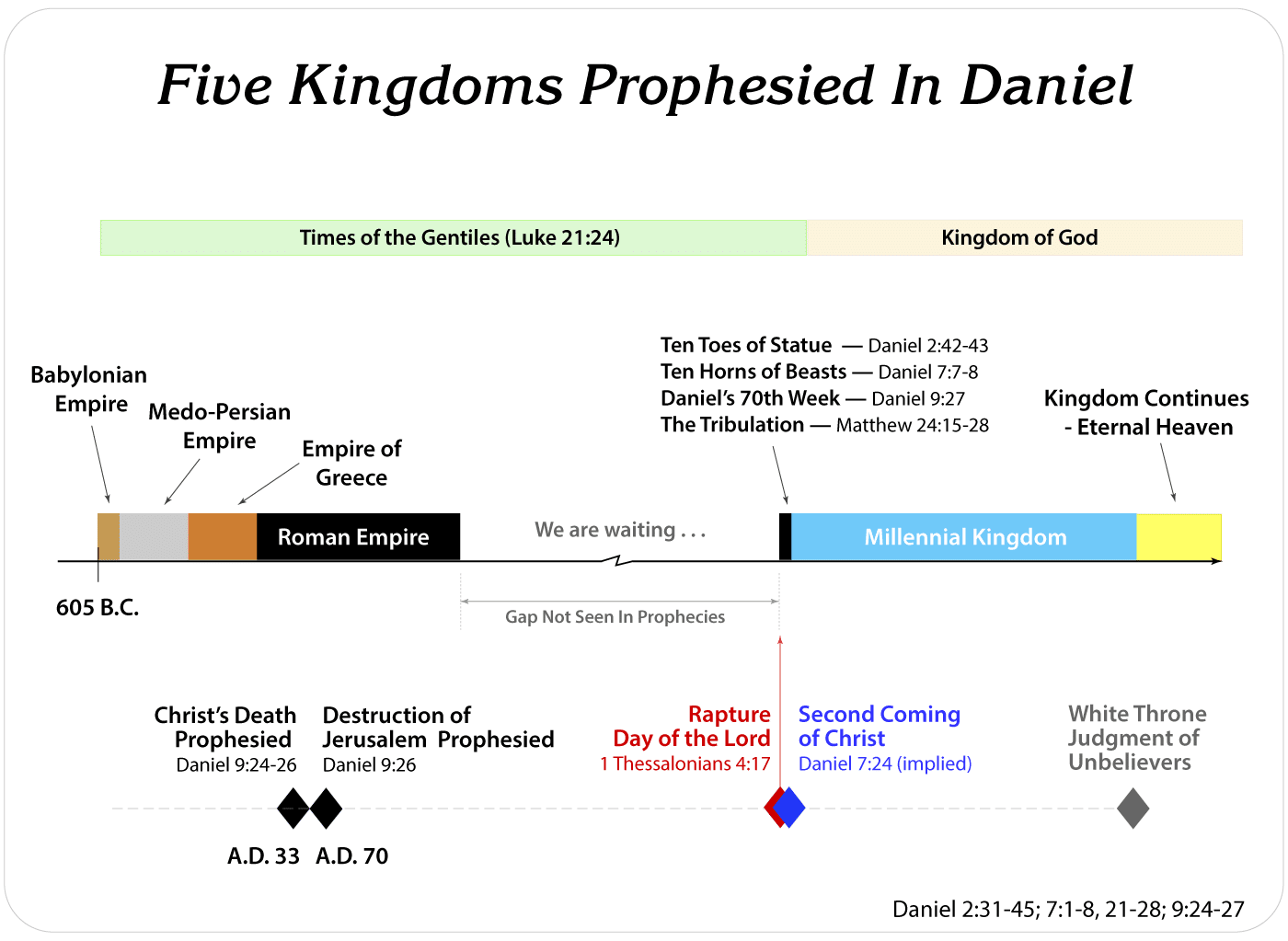
Description of the Rapture
Now, we are ready for our study which is from 1 Thessalonians 4:13-18. It is about the rapture. We have already learned that the rapture occurs before the tribulation. 1 Thessalonians 4:13 begins to describe the rapture for us.
But we do not want you to be uninformed, brethren, about those who are asleep, so that you will not grieve as do the rest who have no hope. 1 Thessalonians 4:13 (NASB)
The apostle Paul is writing to the believers in Thessalonica. Paul knows they are worried about their loved ones who were believers, but have already died. When he says “asleep,” he means they are dead. Paul is using the word “asleep” symbolically. He did not mean they were sleeping in the grave. John 11:11-14 helps us understand this word “asleep.” In that passage, Jesus told the disciples that Lazarus was “asleep,” Then He explained that Lazarus was dead. That is Paul’s meaning here. This is a good example of a symbolic term that is explained by Scripture – not by creativity.
Then in verse 14, Paul adds,
For if we believe that Jesus died and rose again, even so God will bring with Him those who have fallen asleep in Jesus. 1 Thessalonians 4:14 (NASB)
When Paul says, “if we believe that Jesus died and rose again,” he uses a Greek first class “if.” The first class “if” means that the answer to the “if” is, “Yes!” That is, they did believe Jesus died and rose again. Consequently, they should also believe God would raise up those believers who have already died.
In verse 15 Paul says,
For this we say to you by the word of the Lord, that we who are alive and remain until the coming of the Lord, will not precede those who have fallen asleep. 1 Thessalonians 4:15 (NASB)
The phrase “word of the Lord” refers to a revelation that God gave to Paul. That is, God revealed to Paul that those believers who had already physically died will be raised first. Once again, we have another example of God revealing His future plans. God is not just interested in only our godly behavior. He treats us like family. He wants us to know what is going to happen!
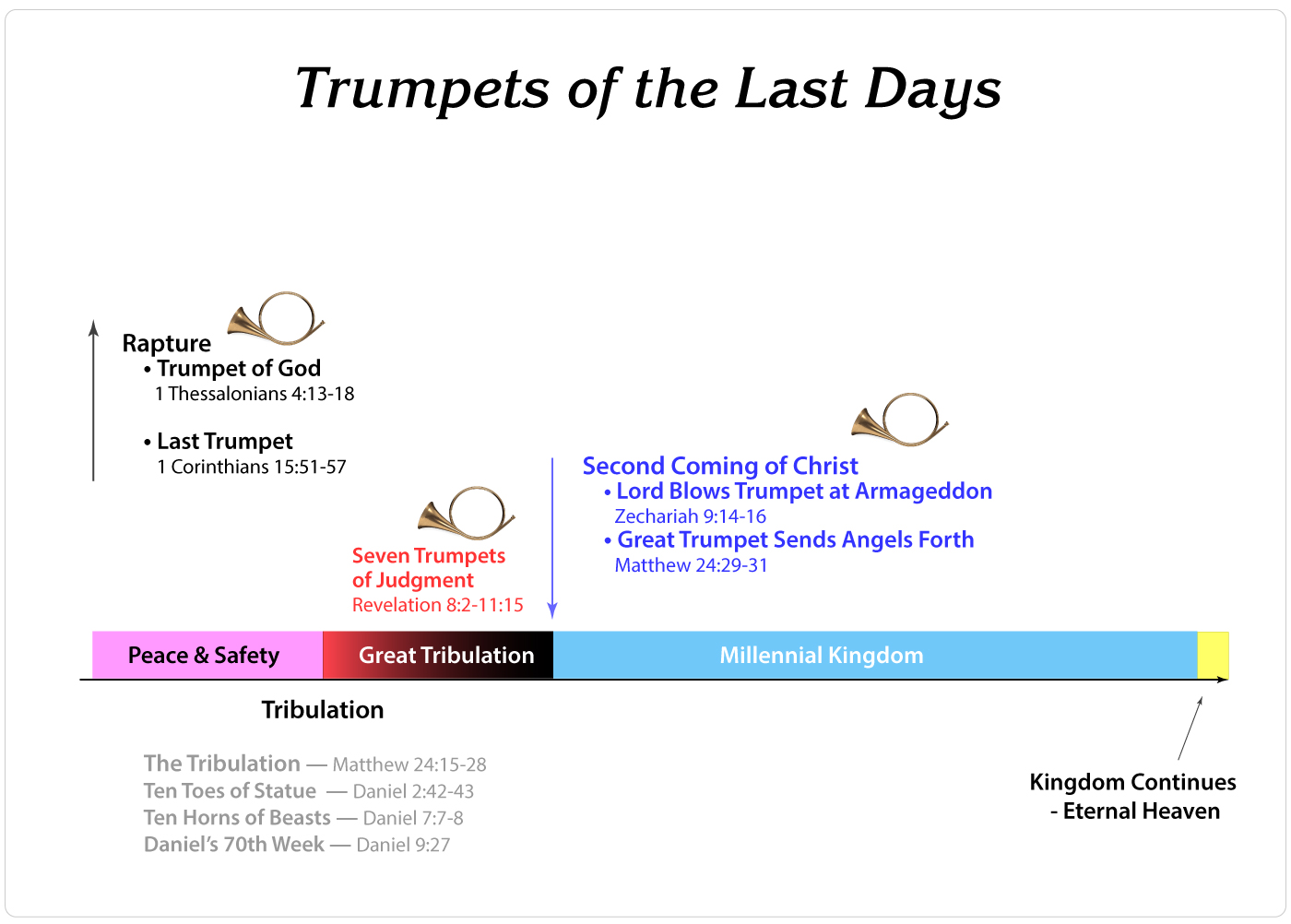
Side Comment
Now you might ask, “When do believers get their immortal bodies? Do we get them when we die?” The answer is no! The apostle Paul gives us the answer in 2 Corinthians 5:1-4. In verse 3 he told us that when a believer dies and goes to heaven, we will be naked. When he said “naked,” he did not mean that we will show private parts in heaven. Paul was referring to the fact that we will not have our immortal bodies yet. We will be spirits in heaven. This means that when a believer dies and goes to heaven, they are a spirit without their immortal bodies.
1 Corinthians 15:51-53 explains that believers will receive their immortal bodies at the rapture. Here is 1 Corinthians 15:51-53.
Behold, I tell you a mystery; we will not all sleep, but we will all be changed, in a moment, in the twinkling of an eye, at the last trumpet; for the trumpet will sound, and the dead will be raised imperishable, and we will be changed. For this perishable must put on the imperishable, and this mortal must put on immortality. 1 Corinthians 15:51-53 (NASB)
Paul says, “I tell you a mystery.” That means, it was not revealed before. God wants us to understand something that He considers to be important. The message is that our spirits will be clothed with an immortal body. Why does God keep telling us about the future? Because He was us to know! He is seeking to comfort us about what will happen to us!
Now, notice verse 52 says this will happen at the last trumpet. It is important to know that this trumpet cannot be one of the seven trumpets that will occur during the tribulation, since there is a final trumpet that will sound at the second coming of Christ (Matthew 24:31). I believe the trumpet in verse 52 is the last trumpet in the church age. The church age ends.
The Meaning of Caught Up
Now back in 1 Thessalonians 4:16 we are told,
For the Lord Himself will descend from heaven with a shout, with the voice of the archangel and with the trumpet of God, and the dead in Christ will rise first. Then we who are alive and remain will be caught up together with them in the clouds to meet the Lord in the air, and so we shall always be with the Lord. 1 Thessalonians 4:16-17 (NASB)
There are three important points to learn from these verses. First, we are told the Lord Himself will descend from heaven. When He descends, the dead believers will rise first. Then all the believers who are living will be caught up. Instantaneously, every believer will be clothed with their immortal bodies. Together, we will meet Jesus in the air and always be with the Lord. I like the fact that God told us we will be with Jesus forever. Once again, I am thrilled that God the Father wants us to know this. He wants to comfort us!
The second important point is that the word “caught up” comes from the Greek word harpazo. It means “to snatch up,” “to seize,” or “to carry off by force.” That is, Christ will forcefully pull us up to Himself. Someone will be flying an airplane and disappear from the pilot seat. Someone will be preaching and disappear. Imagine a non-Christian parent spanking a Christian child, and the child disappears. Trying to hang on to something here on earth, like a cat clawing onto something, will not work. When Jesus comes to take us home, we are going home!
Another Side Comment
Some individuals have said that the rapture is not biblical because the word rapture cannot be found in the Bible. But that does not mean the concept is not in the Bible. In fact, the English word “rapture” comes from the Latin word raptura which corresponds to the Greek word harpazo. So, the rapture is taught in the Bible.
“Fireworks” at the Rapture
The third important point is that the Greek word for “shout” in verse 16 refers to the shouting of a loud order such as a military commander would give to his soldiers. Now we are not told who will give the shout. Maybe Jesus will give the shout or someone else. Notice that we are also told that the shout will be joined by the voice of an archangel. The only archangel named in Scripture is Michael (Jude 9), but we can be confident there are other archangels. In addition to the shout, and the voice of an archangel, a trumpet of God will blast. This means that when the rapture occurs, there will be a loud command, an archangel will shout, and a trumpet will blast. What a tremendous and glorious event the rapture will be! It will be noisy fireworks! It will look forward to believers going home and God judging a wicked world and setting up His millennial kingdom.
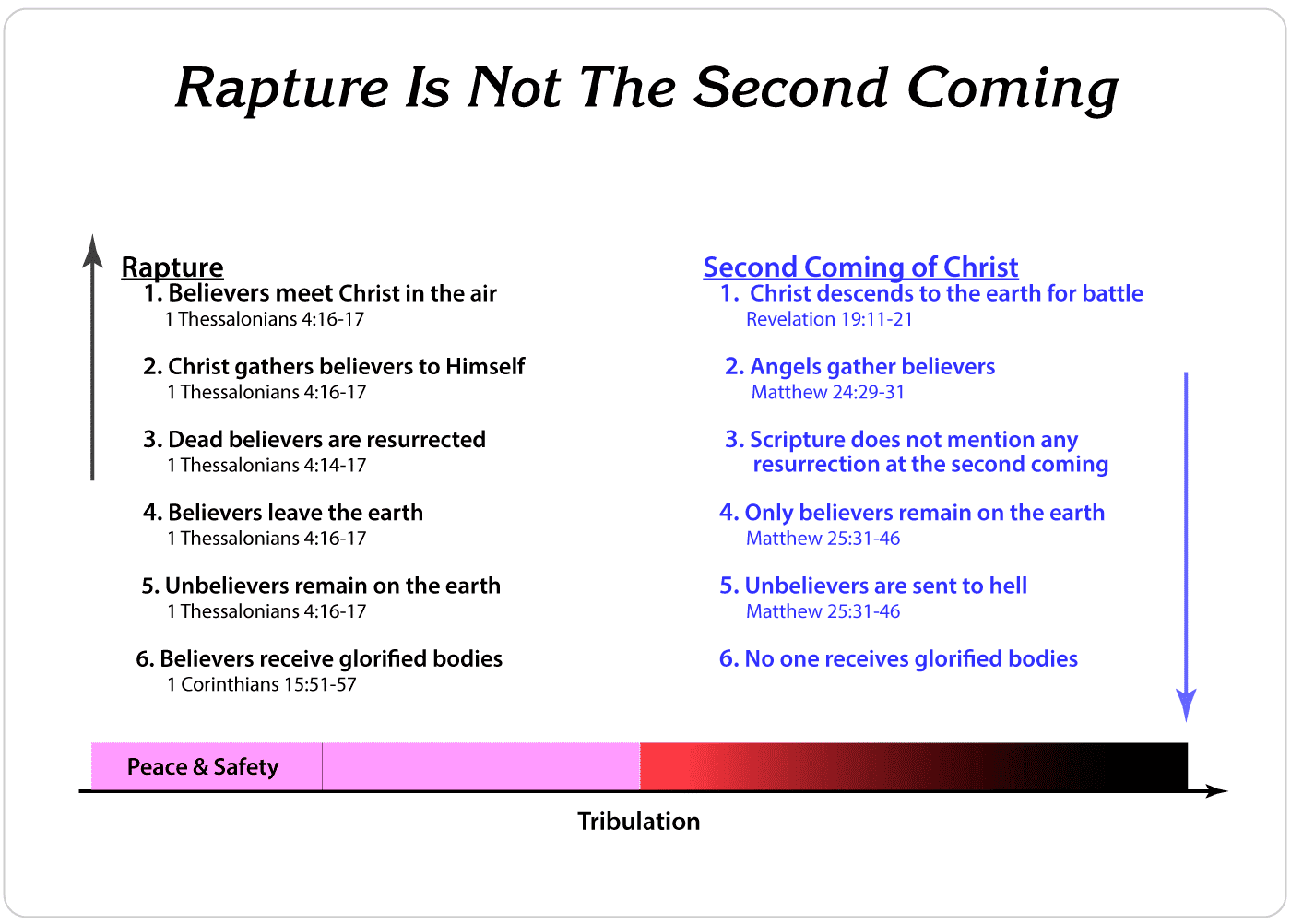
The Rapture is not the Second Coming
Next, I want to discuss four reasons why we believe the rapture is not the same as the second coming of Christ.
Caught Up — Come Down
The first reason why we believe the rapture is not the second coming is that at the rapture believers are caught up to Christ in the air (1 Thessalonians 4:16-17), but at the second coming of Christ, He descends down to the earth (Zechariah 14:1-8; Matthew 24:29-31; Revelation 19:11-21). We have already discovered from 1 Thessalonians 4:16-17 that believers will meet Christ in the air at the rapture. Now here is what will happen at the second coming of Christ as explained in Revelation 19:11-21.
And I saw heaven opened, and behold, a white horse, and He who sat on it is called Faithful and True, and in righteousness He judges and wages war. His eyes are a flame of fire, and on His head are many diadems; and He has a name written on Him which no one knows except Himself. He is clothed with a robe dipped in blood, and His name is called The Word of God. And the armies which are in heaven, clothed in fine linen, white and clean, were following Him on white horses. from His mouth comes a sharp sword, so that with it He may strike down the nations, and He will rule them with a rod of iron; and He treads the wine press of the fierce wrath of God, the Almighty. And on His robe and on His thigh He has a name written, “KING OF KINGS, AND LORD OF LORDS.” Then I saw an angel standing in the sun, and he cried out with a loud voice, saying to all the birds which fly in midheaven, “Come, assemble for the great supper of God, so that you may eat the flesh of kings and the flesh of commanders and the flesh of mighty men and the flesh of horses and of those who sit on them and the flesh of all men, both free men and slaves, and small and great.” And I saw the beast and the kings of the earth and their armies assembled to make war against Him who sat on the horse and against His army. Revelation 19:11-19 (NASB)
Notice that Christ will come down out of heaven and make war with the armies of the world. The rapture is not like the second coming of Christ.
Christ Draws Believers —Holy Angels Gather Believers
A second reason we believe the rapture is not the same as the second coming, is that at the rapture, Christ draws believers to Himself (1 Thessalonians 4:16-17), but at the second coming the angels gather together the elect from the four winds (Matthew 24:31). That is the message of Matthew 24:29-31, which is about the second coming. Here is the passage,
But immediately after the tribulation of those days THE SUN WILL BE DARKENED, AND THE MOON WILL NOT GIVE ITS LIGHT, AND THE STARS WILL FALL from the sky, and the powers of the heavens will be shaken. And then the sign of the Son of Man will appear in the sky, and then all the tribes of the earth will mourn, and they will see the SON OF MAN COMING ON THE CLOUDS OF THE SKY with power and great glory. And He will send forth His angels with A GREAT TRUMPET and THEY WILL GATHER TOGETHER His elect from the four winds, from one end of the sky to the other. Matthew 24:29-31 (NASB)
That is, angels will go forth to gather the elect, or believers. The angels will do this at the second coming in preparation for the kingdom. So, at the rapture, Christ draws believers to Himself, but at the second coming the angels gather together the elect.
Resurrection of Believers — No One is Resurrected
A third reason we believe the rapture is not the same as the second coming is that at the rapture, dead believers are resurrected (1 Thessalonians 4:14-17). In contrast at the second coming of Christ, Scripture does not mention anyone being resurrected (Matthew 24:29-31; Revelation 19:11-21).
Unbelievers Remain on the Earth — Believers Remain on the Earth
A fourth reason we believe the rapture is not the same as the second coming is that at the rapture, unbelievers remain on the earth since 1 Thessalonians 4:14-17 states that only believers are removed. But, at the second coming, believers remain on the earth and enter the kingdom after the Sheep and Goat judgment (Matthew 25:31-46).
Why is this true? The answer is found in Matthew 25:31-46 where the Sheep and Goat Judgment is described. This judgment occurs after the second coming. The passage teaches that Jesus will only allow Christians to enter the millennial kingdom. Non-Christians will be sent to hell and wait for the final judgment. The point is that only believers will remain on the earth and enter the millennial kingdom. This includes those believers who returned to earth with Christ and those who became believers during the tribulation. We will talk more about this passage in our next study.
Christians will not Enter the Tribulation
I want to close by giving you several reasons why Christians will not enter the tribulation. First, we have already discovered in 1 Thessalonians 4:13-5:3 that the rapture occurs first. The second reason I believe believers will be rescued from the rapture is that 1 Thessalonians 1:10 says,
. . . and to wait for His Son from heaven, whom He raised from the dead, that is Jesus, who rescues us from the wrath to come. 1 Thessalonians 1:10 (NASB)
That is, Christ will rescue believers from the wrath to come. This is important because later Paul talks about the destruction that will occur in the fifth chapter, when he wrote,
While they are saying, “Peace and safety!” then destruction will come upon them suddenly like labor pains upon a woman with child, and they will not escape. 1 Thessalonians 5:3 (NASB)
Notice Paul said, “destruction will come upon them suddenly like labor pains upon a woman with child.” Then in verse 9, Paul added,
For God has not destined us for wrath, but for obtaining salvation through our Lord Jesus Christ . . . 1 Thessalonians 5:9 (NASB)
When Paul says “salvation,” he is referring to our ultimate salvation. He is referring to our departure and going to heaven. I rejoice that he says we are not destined for wrath, because during the tribulation God pours out His wrath upon a God-rejecting world.
Conclusion
What have we learned? We have learned the rapture will occur before the tribulation, because God wants to rescue believers from the horrors of the tribulation. We have learned that the rapture is not the second coming of Christ. Once again, we have learned that God wants us to know His plan for the future. He has not saved us and forgotten about us! He is not urging us to just obey and be holy. He wants us to know what will happen to us and that He cares about us! He is our great and holy God.
Suggested Links:
Book of 2 ThessaloniansGod’s Timeline For The Future
Day of the Lord
Judgment of the Nations
The Church Is Missing
